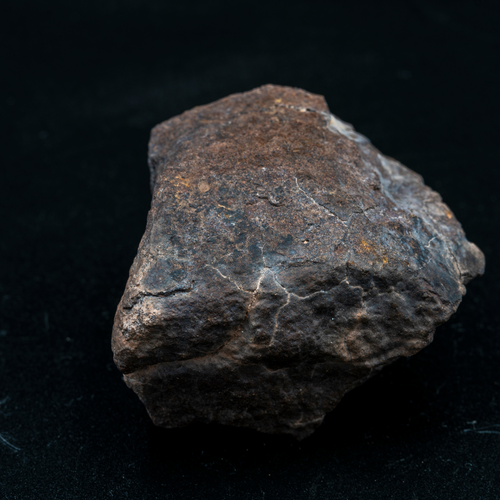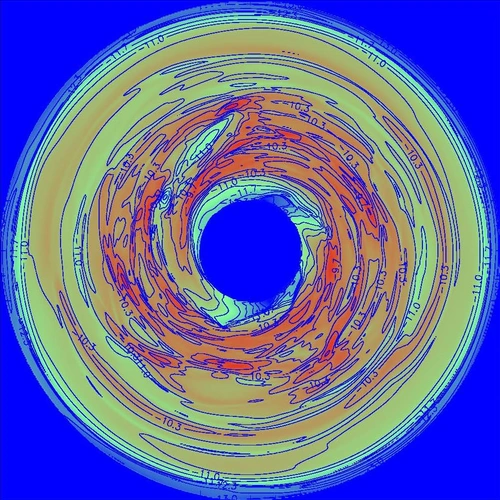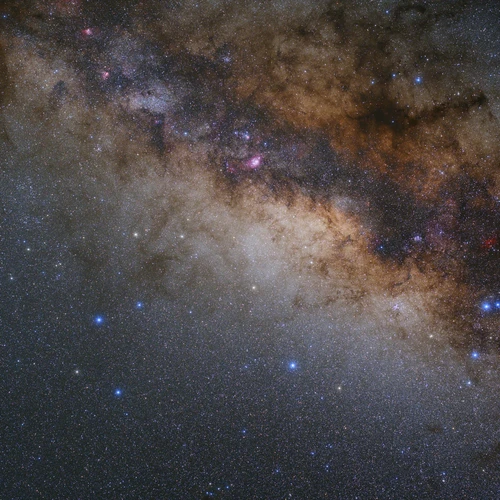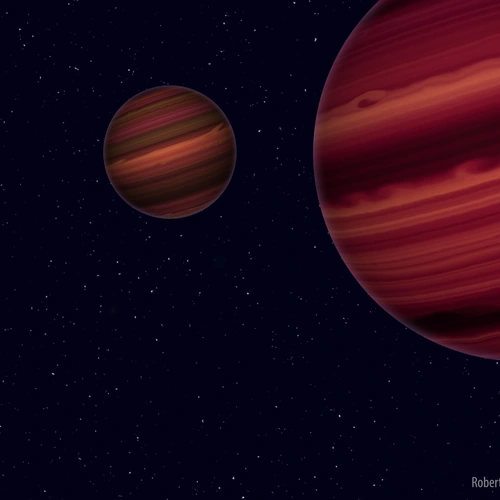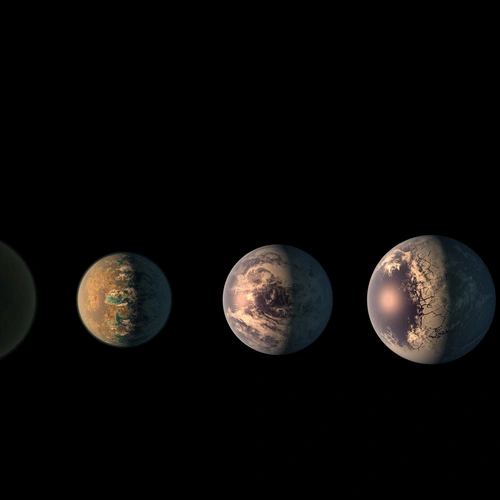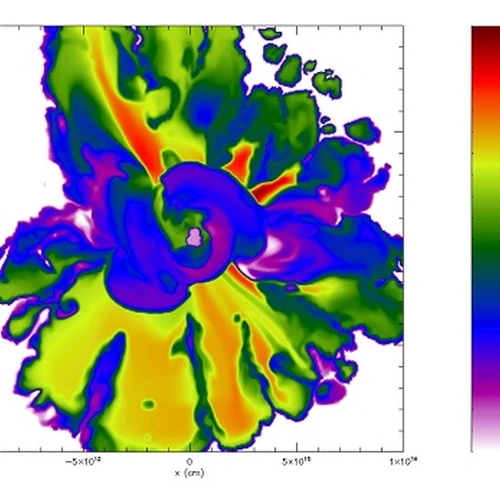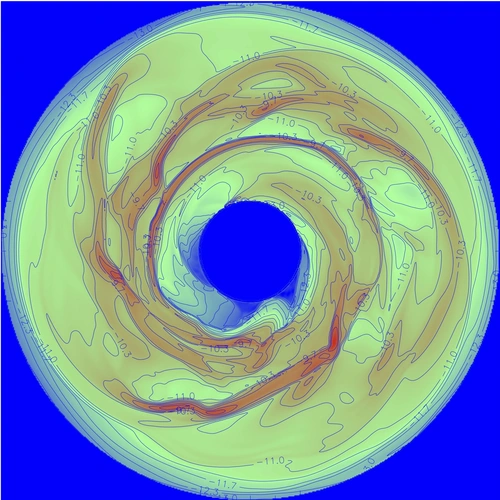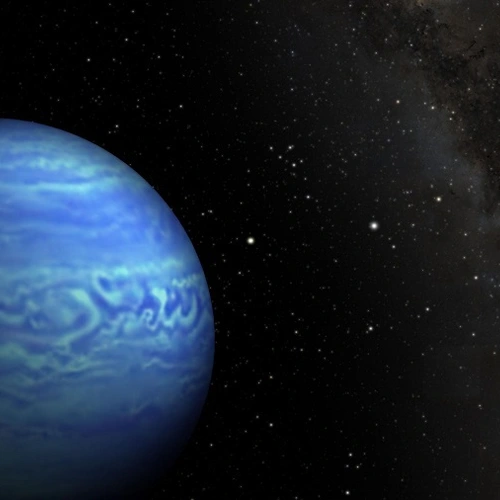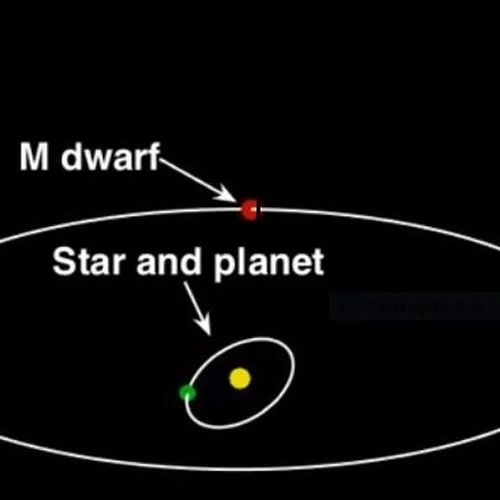Overview
Alan Boss is a theorist and an observational astronomer. His theoretical work focuses on the formation of binary and multiple stars, triggered collapse of the presolar cloud that eventually made the Solar System, mixing and transport processes in protoplanetary disks, and the formation of gas giant and ice giant protoplanets. His observational works centers on the Carnegie Astrometric Planet Search project, which has been underway for the last decade at Carnegie's Las Campanas Observatory in Chile.
A shock from an exploding star called a supernova has been considered the most attractive mechanism for introducing short-lived radioisotopes (SLRIs) into the solar nebula. Boss has been modeling the problem of simultaneous triggering and injection. His results support the supernova trigger hypothesis because thin supernova shocks are better at injecting SLRIs than the thick planetary nebula. Boss is currently running 3D models, including the effects of target cloud rotation, to learn to what extent injection occurs into a protoplanetary disk formed as a result of triggered collapse.
Boss also studies the mixing and transport of solids in protoplanetary disks to form gas giant planets similar to Jupiter, or to undergo outbursts in marginally gravitationally unstable (MGU) disks. Boss' 3D models show how crystalline silicates, observed in the outskirts of protoplanetary disks and in long-period comets, could have been formed by thermal “cooking” closer to their protostar and then transported back outward to cooler regions of the disk. Boss has joined with Conel Alexander and Morris Podolak to study the detailed thermal evolution of finite-size particles in MGU disks.
While the core accretion mechanism is still considered by most to be the leading explanation for the formation of our solar system's gas giant planets, for the last decade Boss has been working to learn whether another mechanism, disk instability, could also form gas giant planets.
Along with Alycia Weinberger and Ian Thompson, Boss has been running the Carnegie Astrometric Planet Search (CAPS) program, which searches for extrasolar planets by the astrometric method, where the planet's presence is detected indirectly through the wobble of the host star around the center of mass of the system. With over six years of CAPSCam data, they are beginning to see likely true astrometric wobbles..
Boss received his B.S. from the University of South Florida and his M.A. and Ph. D. in physics from UC-Santa Barbara, where he was also a postdoctoral researcher. Before joining Carnegie in 1981 as a staff associate (now a staff scientist), he was a research associate at NASA Ames Research Center. For more information see http://www.dtm.ciw.edu/people/alan-p-boss
Research
While fragmentation is universally recognized as the dominant formation mechanism for binary and multiple stars, there are still major questions remaining to be answered. The most important of these is the role of magnetic fields. Boss has studied the collapse of individual molecular cloud cores with a MHD code, Enzo, in order to constrain the chances for binary and multiple star system formation. Enzo is an adaptive mesh refinement (AMR) code, giving it the flexibility needed to follow binary fragments. These calculations helped to define which cloud cores are likely to collapse to form single stars, such as our Sun.
Alan Boss studies the mixing and transport of solids in protoplanetary disks of the type necessary in order to form gas giant planets similar to Jupiter, or to undergo FU Orionis outbursts, i.e., in marginally gravitationally unstable (MGU) disks.
In such disks, solids of cm-size and smaller should be transported along with the gas through gravitational torques associated with the growing and chaotically evolving spiral arms and clumps. Boss' 3D EDTONS code models show how how crystalline silicates, observed in the outskirts of protoplanetary disks and in long-period comets, could have been formed by thermal annealing closer to their protostar and then transported back outward to cooler regions of the disk.
Boss has joined with Conel Alexander and Morris Podolak to study the detailed thermal evolution of finite-size particles in MGU disks. Besides studying rim formation, they intend to focus on the transport of ice mantles from the outer nebula to the inner nebula, with implications for the transport of water to the habitable zone of the solar nebula.
Along with Alycia Weinberger and Tri Astraatmadja, Boss has been running the Carnegie Astrometric Planet Search (CAPS) program, which searches for extrasolar planets by the astrometric method, where the planet's presence is detected indirectly through the wobble of the host star around the center of mass of the system. With over thirteen years of CAPSCam data, they see a number of likely astrometric wobbles.
The CAPSCam planet search effort is on the verge of yielding a harvest of astrometrically discovered planets. CAPSCam has already produced accurate parallactic distances to many young stars and M dwarfs.
Learn moreA supernova shock front has been considered an attractive mechanism for introducing short-lived radioisotopes (SLRIs) into the solar nebula. Boss has used the FLASH code to study the problem of simultaneous triggering and injection. FLASH is also an AMR code, with a special strength in following shock waves. Boss has shown that FLASH 2D and 3D models support the supernova trigger hypothesis, over, e.g., the AGB star hypothesis for the origin of SLRIs, because thin supernova shocks are better at injecting SLRIs than the thick planetary nebula winds produced by AGB stars. Boss has computed 3D models with FLASH, including the effects of target cloud rotation, to learn to what extent injection occurs into a protoplanetary disk formed as a result of triggered collapse.
While the core accretion mechanism is still considered by most to be the leading explanation for the formation of our solar system's gas giant planets, for the last several decades Boss has been working to learn whether another mechanism, disk instability, could also form gas giant planets. Boss has used both Enzo and FLASH on disk instability calculations with AMR codes, coupled with calculations with his own 3D radiative hydrodynamics code, EDTONS. The latest calculations support the hypothesis that significant numbers of gas giant planets are formed by the disk instability mechanism, and that future space telescopes will discover them in increasing numbers.
Alan Boss serves as the chair of the NASA Exoplanet Exploration Program’s Technology Assessment Committee and as chair of the Independent Review Team for the NASA Nancy Grace Roman Space Telescope’s Coronagraphic Instrument. Boss is also chair of the Management Advisory Board for the Giant Magellan Telescope Consortium Large Earth Finder (G-CLEF).
CV
- Ph.D. Physics, 1979, University of California, Santa Barbara,
- M.A. Physics, 1975, University of California, Santa Barbara
- B.S. Physics, 1973, University of South Florida
- Minor Planet (29137) named Alanboss (1987)
- Fellow, American Geophysical Union (2000)
- Benson Memorial Lecturer, Miami University (2000)
- Fellow, American Association for the Advancement of Science (2001)
- Fellow, Meteoritical Society (2002)
- Fellow, American Academy of Arts and Sciences (2003)
- Carnegie Evening Lecturer, Carnegie Institution (2004)
- Scottish Universities Physics Alliance Distinguished Visitor (2008)
- NASA Group Achievement Award for Astrobiology Roadmap (2008)
- Yuval Ne'eman Lecturer & Sackler Distinguished Lecturer, Tel Aviv University (2010)
- NASA Group Achievement Award for SIM Planet Finding Capability Study Team (2010)
- Carl Seyfert Lecturer, Vanderbilt University (2012)
- NASA JPL STAR Award, Jet Propulsion Laboratory Astronomy & Physics Directorate (2017)
- Carnegie Observatories Telescope Assignment Committee (2013-14)
- Chair, Carl Sagan Fellowship Committee, NASA Exoplanet Science Institute, Pasadena, California (2013-14)
- Chair, NASA WFIRST Coronagraph Preparatory Science Review Panel (2014)
- Carnegie Science Venture Review Panels (2016-18)
- Carnegie Observatories Telescope Assignment Committee (2018-19)
- Carnegie Science Venture Review Panel (2020)
- American Astronomical Society
- Division for Planetary Science of the American Astronomical Society
- Division on Dynamical Astronomy of the American Astronomical Society
- American Geophysical Union
- American Association for the Advancement of Science
- International Astronomical Union
- Meteoritical Society
- American Academy of Arts and Sciences
- President, Commission 51: Bioastronomy, International Astronomical Union (2006-
- Founding Member, NASA Nexus for Exoplanet System Science Network (2015-)
- Chair, Carnegie Institution Space Earth Life Book Advisory Committee (2016-)
- NASA Astrophysics Advisory Committee, NASA Astrophysics Division (2017-19)
- NAS/NRC Astrobiology Science Strategy Committee (2017-18)
- Past Chair (Emeritus), NASA Exoplanet Exploration Program Analysis Group (2018-19)
- Chair, NASA Independent Review Team, Roman Space Telescope Coronagraphic Instrument (2018-23)
- NASA Exoplanet Exploration Program Science Interest Group on Demographics (2018-)
- Chair, G-CLEF Management Advisory Board (2020-)
Timeline
Media and Recorded Talks
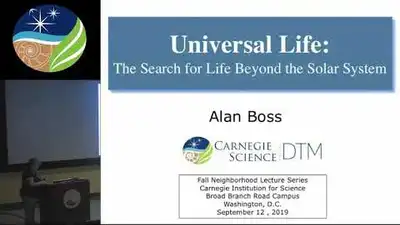
UNIVERSAL LIFE: THE SEARCH FOR LIFE BEYOND THE SOLAR SYSTEM by Alan Boss
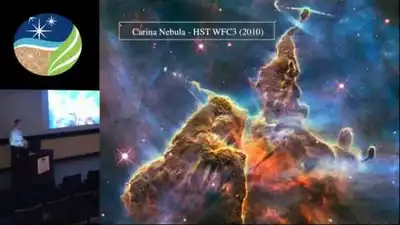
Alan Boss: "The Shocking Story of the Origin of the Solar System"
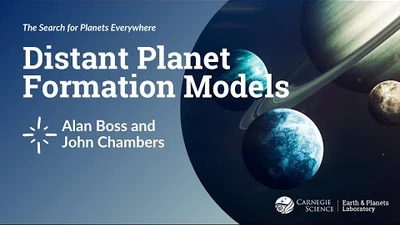
Distant Planet Formation Models. I. Observations and Disk Instability. II. Core and Pebble Accretion

